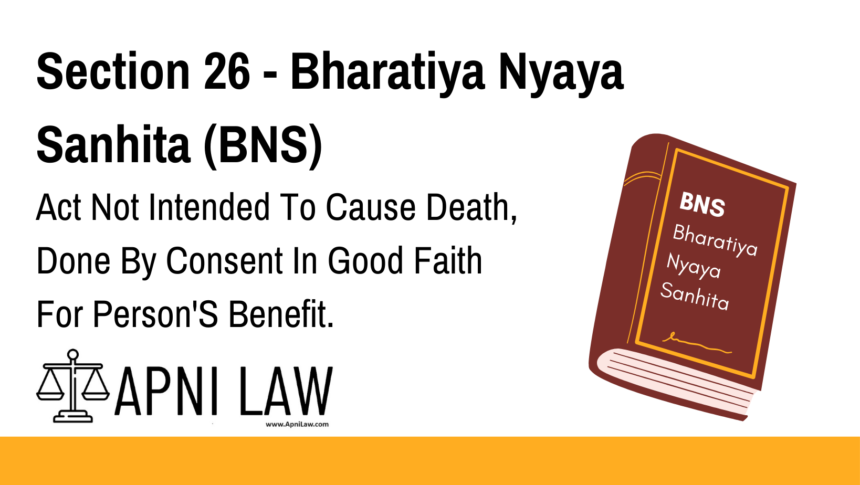Code: Section 26 BNS
Section 26
Nothing, which is not intended to cause death, is an offence by reason of any harm
which it may cause, or be intended by the doer to cause, or be known by the doer to be likely
to cause, to any person for whose benefit it is done in good faith, and who has given a
consent, whether express or implied, to suffer that harm, or to take the risk of that harm.
Illustration.
A, a surgeon, knowing that a particular operation is likely to cause the death of Z, who
suffers under the painful complaint, but not intending to cause Z’s death, and intending, in
good faith, Z’s benefit, performs that operation on Z, with Z’s consent. A has committed no
offence.
Explanation of Section 26 BNS
Section 26 of the Bharatiya Nyaya Sanhita (BNS), 2023 provides legal protection for acts performed:
- With the consent of the person affected.
- In good faith, meaning there is no malicious intent.
- For the benefit of the person giving consent.
- Without the intention to cause death.
Key Highlights:
- Focus on Benefit: The law safeguards actions that aim to help the person, even if they involve some risk.
- Consent is Crucial: The person affected must agree to the act beforehand.
- No Malicious Intent: The person performing the act must have pure intentions and act in good faith.
Illustrations of Section 26 BNS
Example 1: A Risky Medical Surgery
A patient consents to a complex surgery that carries a small risk but is necessary for survival. Since the doctor acts in good faith and for the patient’s benefit, they cannot be held criminally liable if complications arise.
Example 2: A Firefighter’s Rescue Attempt
A firefighter pulls an injured person from a burning building, risking minor injuries to the person. Since the act is done for the victim’s benefit and not intended to cause death, it is protected under Section 26.
Common Questions & Answers on Section 26 BNS
1. What is the key difference between Section 25 and Section 26 of BNS?
- Section 25 protects acts done with consent that are not intended to cause serious harm.
- Section 26 applies when an act is done for a person’s benefit with their consent and in good faith.
2. Can this section apply to life-saving but risky treatments?
Yes. If a doctor performs emergency surgery with the patient’s consent, in good faith, and to save the patient, they are not liable under Section 26.
3. What if the act unintentionally results in death?
If death was not intended and the act was done with consent, in good faith, and for benefit, Section 26 may still apply. However, other sections of BNS may come into effect depending on the situation.
4. Can this section protect someone performing first aid?
Yes. A person who gives first aid to an accident victim, even if they accidentally cause minor harm, is protected as long as they acted in good faith and for the victim’s benefit.
Conclusion
Section 26 of the BNS, 2023 protects individuals performing acts with consent, in good faith, and for the benefit of another. It is commonly applicable in medical treatments, rescues, and emergency interventions.
For more legal insights, visit ApniLaw! 🚀








